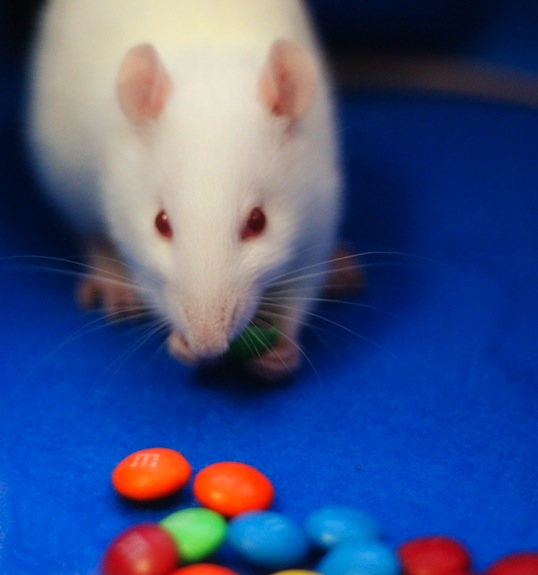Researchers out of the University of Michigan recently published a research project investigating the presence of Enkephalin in the brains of rats. To begin, they monitored Enkephalin levels in the neostriatum of rats and found that when the rats were offered unlimited amounts of M&M's, they indulged until their heart's desire and eventually became full and stopped eating. During the time of consumption their Enkephalin levels rose rapidly. When they stopped eating the M&M's the Enkephalin rush stopped and other mechanisms to stop consumption probably kicked in.
To investigate the hopeful link between Enkephalin and food consumption, the researchers flooded the neostriatums of the rats with an Enkephalin synthetic called DAMGO. The rats were free to eat as many M&M's as they wanted and ended up gobbling more M&M's than before, at a faster rate. In fact, they ate approximately 5% of their body weight and had to be forcibly removed from the M&M supply. Thats like all of us master's students eating about 8lbs of M&M's each in just one hour! The researchers ultimately concluded that the Enkephalin surge in the experimental rats, versus the controls, only made the rats want to eat more and more at a fast pace but didn't make the eating experience more pleasurable. Enkephalin may be a new research avenue in obese individuals and drug addicts because of its craving nature to make obese people keep eating beyond when they are happily full and drug addicts keep returning to their drug of choice. (Additionally, it may make you crave more sweet snacks or fast food!)
So, next time you're mindlessly wolfing down a bag of sweets while you're studying - remember those Enkephalins in your neostriatum and stop at a reasonable amount!
DiFeliceantonio AG, Mabrouk OS, Kennedy RT, Berridge KC.
(2012). Enkephalin Surges in Dorsal Neostriatum as a Signal to Eat. Current Biology, 10.1016. http://www.sciencedirect.com/science/article/pii/S0960982212009426

After reading this it made me wonder about the difference of cravings between people. Some people crave sweet treats and others crave salty. Since you discussed the sweet side I found a paper that could describe the salty cravings.
ReplyDeleteThis paper describes the "The Salted Food Addiction Hypothesis", which is that salty food acts like an opiate agonist (aka endorphin) which we perceive as yummy and delicious. The withdrawal of the opiate receptor will cause an increase of the salty craving and therefore that person will eat more.
They found they opiate dependent group of 27 individuals gained 6.6% weight gain when in opiate withdrawal.
Therefore, urges and cravings may be a result of opiate withdrawal and could be related weight gain. Think about how many people in America eat fast food everyday and the amount of salt in those meals and how obese America is!
Either way, salty or sweet cravings we need to stop at a reasonable amount like this blog suggests.
Cocores JA, Gold MS. (2009) The Salted Food Addiction Hypothesis may explain overeating and the obesity epidemic. Med Hypotheses. ;73(6):892-9.
Do you know if it is currently known whether there are any natural Enkephalin antagonists or chemicals that counteract this "sweet craving" mechanism in the brain? It seems that there should be some innate balancing act that occurs normally in human and mice brains, and perhaps the very high dose of DAMGO resulted in throwing this balance temporarily or permanently off. If a Enkephalin does indeed play a large role in craving and over-eating sweets, then an Enkephalin antagonist could have really valuable implications for obese individuals and I'm sure pharmaceutical companies would be all over developing a drug.
ReplyDeleteThe article and above comments got me interested in the debate of whether over eating can be categorized as a true addiction or not. From the above post and comments it seems there is solid evidence in support of addiction to salty and sweet foods. In the article, Obesity and Its Relationship to Addictions: Is overeating a Form of Addictive Behavior?", they describe possible treatments of obesity with drugs originally meant for substance abuse reduction. An example is Topiramate, which inhibits dopamine release and decreases the reward effects of drinking alcohol. It has also proven successful in weight loss for obese individuals. The authors of the article say that thinking of overeating as a psychological addiction has shown successful in developing treatment programs. It's a free and interesting read for those interested. They also outline the similarities between obesity and addictive disorders. Here is the link: http://www.ncbi.nlm.nih.gov/pmc/articles/PMC2910406/
ReplyDeleteMany health bloggers believe that big food companies are making the food addictive by making them full of fat and sugar. Maybe the companies are "conspiring" to use Enkephalin surges to make you by more of their product. Any way, I could not help to think about casomorphin, an opioid found in high concentrations of cheese. Casomorphin is believed to make cheese addictive. There was a study done in 2009 ( referenced below) that assessed the casomorphin in different types of cheeses. The study found that casomorphin was highest in soft cheese like brie. It would be interesting to see if these soft cheese caused bing eating like adding DAMGO.
ReplyDeleteReference
Sienkiewicz-Szłapka, E., Jarmołowska, B., Krawczuk, S., Kostyra, E., Kostyra, H., & Iwan, M. (2009). Contents of agonistic and antagonistic opioid peptides in different cheese varieties. Toxicology Letters, 19(4), 258–263. doi:10.1016/j.idairyj.2008.10.011
Enkaphalin seems to be inducing a type of addictive behavior, the inability to stop even though there is reduced or no increase in pleasure. The speaker, Dr. Greenwood, that came and spoke with us a few weeks ago, mentioned some of the many benefits of exercise, especially those that he has observed in mice. Exercise has been shown to decrease addictive behavior in humans and mice (Smith et al. 2011). I wonder if exercised mice would be protected against some of the effects of Enkaphalin.
ReplyDeleteSmith MA, Lynch WJ. (2011) Exercise as a potential treatment for drug abuse: Evidence from preclinical studies. Front Psychiatry. 2: 82. doi:10.3389/fpsyt.2011.00082